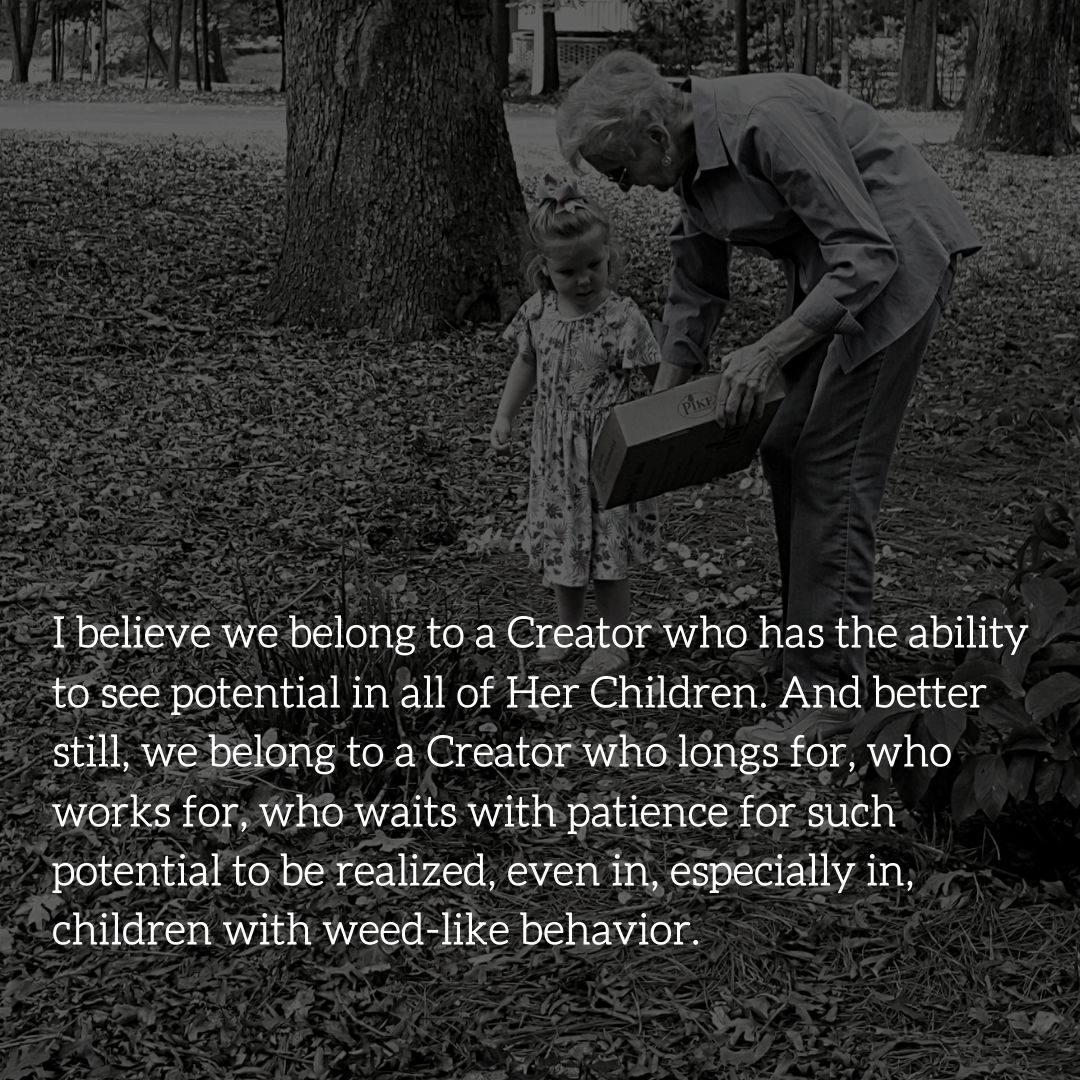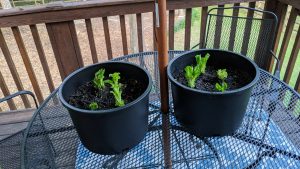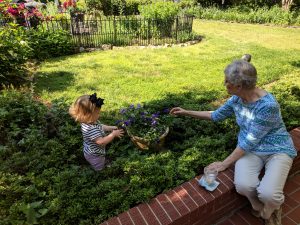Violets

Violets
Bob Stillerman
Proper 11, Seventh Sunday after Pentecost, 7/19/2020
Matthew 13:24-43
Violets Matthew 13.24-43 7-19-2020
Clarence Jordan once wrote, “God is not a celestial prison warden jangling the keys on a bunch of lifers. God is a shepherd searching for his sheep, a father searching for his child, an old woman searching for her coin.” I have always loved this quote, because, for me, it sharpens the image of a benevolent God. Here is One who seeks, who pursues, who searches for Her beloved. And when God finds Her beloved, She celebrates them, and affirms them, and readies them to live into their potential.
I realize we’re reading Matthew’s gospel this morning, and I also realize that it’s Luke’s who tells us about lost sheep and sons and coins. But sometimes, we need to pause, and we need to consider what we understand to be the nature and character of our God. In other words, what’s your context for God? Because some of the time, maybe even most of the time, I think we need to let God’s character lead us as much as the texts we read. I think that’s especially true for some of Matthew’s texts, today’s included, that are heavy on judgment, and absolute depictions of good-and-evil, and end-of-times.
So, before we even begin considering our text, I want to ask you to think about what kind of decision-maker God is. Is God rash? Is God inflexible? Does God define each one of us in absolute terms? Does God discard those of us who fall short in game-show-like fashion, with fancy red buttons and zapping motions? Does God dole out retributive, vengeful justice for the world?
Or, or, is God patient? And creative? And adaptable? And ambiguous? Is God a hugger instead of a zapper? Does God offer restorative, healing justice for the world?
Well, when I read this morning’s text, I was thinking about a God who likes to hug people, and who is creative in offering healing. That version of God colors my interpretation of our text.
One day, a householder went to the locally-owned nursery, bought their finest organic seed, and spread it generously in the field. We aren’t told why, or even who did it, maybe the householder cut someone off on Highway 51 or skipped a place in line, but someone, an enemy, came by night and sowed bad seeds, weeds, in the field. A few weeks later, when the seeds began to break through the soil, the householder’s workers identified the problem: “Uh-oh, boss, you’ve got bad weeds mixing with good wheat! What did you buy? And should we start weeding right away?” The householder assures the laborers that what was planted was of good quality, but someone has sabotaged the operation. “Don’t pull up the weeds just yet though, the householder instructs, “You’ll only end up hurting the good wheat in the process. Let’s wait until the harvest, then we can more easily and more accurately separate the weeds from the wheat; when both piles are gathered, we’ll burn the weeds and store the wheat.”

There are lot of things we can explore in this passage. We can spend time thinking about the fact that Matthew’s God doesn’t seem to deny the existence of evil in the world, nor does Matthew’s Jesus ignore the fact that there are counterforces to his ministry. So in this week’s parable, it’s not just a lack of fertile soil that challenges discipleship, it’s the existence of active agents seeking to inhibit discipleship.
We can talk about the idea that it’s not easy to distinguish wheat from weeds until the seeds flower. If the field is the church, or our gathered faith community, that means that we might actually have adversarial agents within our own body, and not only that, but we may not be able to recognize them at such an early stage in our growth. And sometimes it may even be the very pillars and systems we falsely deem good. It’s not lost on me that we have another story about master and slave. Could it be that the proponents of the vassal system are weeds posing as wheat? Could it be that social constructions of race, sexuality, class, nationality, etc. – could it be that these constructions are seeds sown to cause destruction, and are especially destructive seeds because they appear to be so similar and familiar to us when we stay in our agricultural bubble?
But what really jumped out at me regarding our parable is the idea of patience. We read the end of this lection, with its talk of angels and demons, rays of sunshine and flaming furnaces, and gnashing teeth (I hate that image!),
and we can tend to view God’s judgment as coming soon, and coming harsh, and coming in absolute terms. What a shame!
The householder says, “Wait, give this process some time. Let’s not jump to conclusions about what’s wholly good and what’s wholly bad. We can do that in due time.” What I hear in this passage is not a command for God’s disciples to weed out those whom they are ill-equipped to recognize, but rather, a reminder that God’s gonna let God’s seed grow, and that God’s gonna cultivate growth in the same way, and with same pursuit as that of shepherds, and daddies, and old women, too.
Last summer, Mary Jane Osborne invited my daughters to come and see her garden. Mary Jane had an adjacent lot to her home, and on the week we came, she asked her gardener not to mow the grass. She thought that my girls would enjoy picking all the violets and dandelions growing amidst the tall grass. They did. Immensely. And we enjoyed watching them. Mary Jane saw something unique and beautiful in those weeds. Where most would see a nuisance, and an impediment to a healthy, manicured lawn, she saw something that would offer pleasure, and joy, and giggles to two little girls. I believe we belong to a Creator who has the ability to see potential in all of Her Children. And better still, we belong to a Creator who longs for, who works for, who waits with patience for such potential to be realized, even in, especially in children with weed-like behavior.

I think for too long, we’ve been focused on a judgment day where there are more people bundled and tossed in a fiery furnace than there are gathered in God’s barn. And yes, yes, yes, there is evil in this world. And I, like each of you, am anxious to root it out. But the pluck and chuck method is a glorified from of retributive justice. And to pluck and chuck our neighbors and our enemies from our communities without first searching for understanding does not model the God who created us; to do so models the very evil that is cyclical, and systemic, and life-draining.
If, like the householder, we take a more measured approach in viewing the life and growth of the seeds among us, we might be delighted to discover that there is much more wheat than weed among us. We might also discover that our rush to identify the weeds in our own field is the very weed that is choking our wheat. The parable doesn’t tell us that God’s barn is small. And the parable doesn’t tell us that God has a quota. And the parable doesn’t tell us that God is in a rush. The parable simply says that God’s going about the process of making God’s world God’s world.
In the meantime, may we simply be bound to God’s grace and God’s love. We may just discover violets in empty lots. We may just discover that so many of the ones we rush to deem intruders just take a little longer to show their potential. We may just discover that there’s no need for a burn pile, because the harvest is just that good.
May it be so, and may it be soon! Amen.
Recent Sermons

A Different Sound
December 14, 2023

A Different View
December 04, 2023
Who Will Be Your Angel? Whose Angel Will You Be?
November 14, 2023


